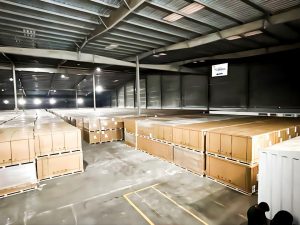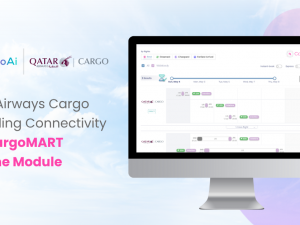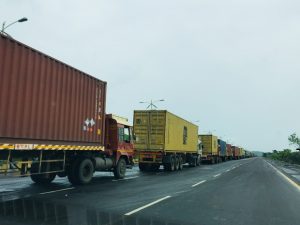Menzies Aviation was recognised as a Silver Sponsor at the recent India Cargo Awards 2025, reaffirming the company’s commitment to advancing India’s air-cargo and logistics landscape. This recognition highlights the firm’s growing presence in the region and its continued efforts to support innovation, operational excellence, and industry collaboration. As the India Cargo Awards celebrate outstanding contributions across the sector, Menzies’ sponsorship reflects its dedication to partnering with key stakeholders and driving the future of efficient, sustainable cargo operations in India.
Read More »Agility, resiliency essential for growth in coming years: KN
Anish Jha, Managing Director, Kuehne+Nagel India (KN), Sri Lanka & Maldives said, “In 2025, the logistics industry showed that customer focus and collaboration remained the strongest drivers of progress. Companies strengthened agility, trust and visibility to keep supply chains steady in a changing environment. The year underlined that resilience is built through shared intent and partnerships, not forecasts. Three themes shaped how organisations navigated the year: Agility to respond, adjusting to fast changing market conditions, resilience to managing rising complexity, and trusting the basis of every customer relationship. Agility took many forms, from adapting production and inventory plans to rebalancing transport modes and reviewing sourcing strategies. The adjustments to USA tariffs were one example of how the firms needed to stay flexible, anticipate cost impacts, and ensure continuity across markets.”
Read More »CSC is Gold Sponsor of India Cargo Awards 2025
Cargo Service Center (CSC) was recognised as the Gold Sponsor at the recent India Cargo Awards 2025, reaffirming its leadership and commitment to excellence within the air cargo and logistics industry. This acknowledgment highlights the company’s ongoing efforts to drive innovation, enhance operational efficiency, and support the growth of India’s cargo ecosystem. As a valued industry partner, CSC continues to play a significant role in elevating service standards and contributing to the sector’s overall advancement.
Read More »Welspun One to open Grade A MMLP in Talegaon, Pune
Welspun One has been allotted 46-acre MIDC-notified land parcel in Talegaon MIDC Phase IV, Pune. The company will develop a 1.2 million sqft., Grade-A logistics park with a planned investment of `550 crore. This move marks Welspun One’s entry into one of India’s most promising logistics micro-markets and strengthen its presence in Maharashtra’s new-age warehousing corridor. This MIDC-notified land parcel is earmarked for developing a premium Grade-A first-mile logistics asset, designed to enable the seamless movement of goods from factories to fulfillment and distribution networks. Located in the Talegaon–Chakan belt, the site sits at the heart of one of India’s vital and sought-after industrial and warehousing micro-markets driven by occupier demand from warehousing and industrial users seeking proximity, scalability, and compliance-led infrastructure.
Read More »KSH opens MCF facility opens in Bhiwandi, Maha
KSH Integrated Logistics launched its new 100,000 sqft Multi-Client Facility, a logistics strategic hub, in Bhiwandi, Maharashtra. This facility marks a step in the company’s aggressive growth strategy to meet the increasing demand from its rapidly expanding customer base. With this addition, KSH’s total footprint in the region now stands at 200,000 sqf., supporting a vision to further expand its capacity to 500,000 sqft., in next two years. The new facility is designed for maximum operational efficiency. Its strategic location, which is in proximity to the Samruddhi Expressway, Delhi Mumbai Expressway and JNPT Virar Expressway, provides faster delivery timelines and improved supply chain management for customers aiming to reach their end consumers quickly. The facility is equipped with modern infra, including a verified Fire NOC, and leverages KSH’s robust Warehouse Management System for seamless, tech-enabled operations — a standard implementation across all KSH MCF facilities.
Read More »‘Customs House Agent–Air’ award goes to Tulsidas Khimji @ICA 2025
Tulsidas Khimji has been honoured with the ‘Best Customs House Agent – Air’ award at the prestigious India Cargo Awards, reaffirming the company’s leadership and excellence in India’s air cargo and customs facilitation sector. The accolade recognises Tulsidas Khimji’s consistent performance in delivering efficient, compliant, and customer-centric customs clearance services for air cargo. With a strong focus on reliability, technology-driven processes, and timely documentation, the company continues to play a vital role in supporting seamless air freight operations across the country. Winning at the India Cargo Awards—often regarded as the benchmark of excellence within the logistics and cargo industry—further underscores Tulsidas Khimji’s contribution to raising service standards and strengthening India’s air cargo ecosystem.
Read More »CargoAi, Qatar Cargo unite to simplify global bookings
CargoAi has marked another step forward with the rollout of its CargoMART Interline solution —its latest innovation aimed at fully digitising and automating interline cargo bookings between airlines, said Mark Drusch, Chief Officer Cargo, QR Cargo. The announcement comes as CargoAi celebrates three years of partnership with QR Cargo, a collaboration that continues to deepen as both companies push the boundaries of digital transformation in air freight. With the launch of the Interline module, QR Cargo can now streamline its digital operations giving customers faster and more efficient interline booking capabilities. CargoMART Interline enables airlines to instantly check and book interline capacity across multiple partner carriers in real time — eliminating the manual coordination typically needed across different time zones and reducing operational complexity., highlighted the strategic importance of the initiative, “Digitalisation remains a cornerstone of QR Cargo’s vision. Our continued collaboration with CargoAi and introduction of CargoMART Interline reinforces our commitment to innovation, enabling us to optimise interline partnerships and deliver a seamless and efficient digital booking experience for customers across an expanded global network,” Drusch added.
Read More »Raipur–Vizag corridor cuts gap by 130 km, boosts road freight
Andhra Pradesh is poised to become the biggest beneficiary of the Raipur–Visakhapatnam Economic Corridor, a major greenfield highway project costing ₹16,482 crore. The corridor will shorten the Raipur–Visakhapatnam route from 597 km to 465 km and is likely to be completed by December 2026. According to officials, the new highway will reduce travel time to Visakhapatnam Port from the current 12–15 hours to just five hours. This improvement will lower fuel use, cut transportation costs, boost movement of trucks, minerals, agricultural produce, and container cargo, thereby opening the door to substantial industrial, logistics and agricultural growth across Andhra Pradesh. For the state’s northern districts — Visakhapatnam, Anakapalle, Alluri Sitharama Raju district, and parts of Vizianagaram — the project promises enhanced connectivity to the industrial regions of Chhattisgarh and Odisha.
Read More »Delhivery ferries medicines via VTOL drone in Deoria, UP
Delhivery completed testing of its autonomous Vertical Take-off and Landing (VTOL) drone technology at Deoria, Uttar Pradesh. Delhivery drone, carried medicines and completed a pre-programmed 12 km flight path autonomously. The mission, which would normally take up to 40 minutes by road due to infrastructure challenges, was completed in 12 minutes, highlighting the potential of aerial logistics to transform last-mile delivery in India. The showcase was held in the presence of Shashank Mani, MP from Deoria. The drone was executed by Delhivery Robotics India, a subsidiary of Delhivery, which has designed and manufactured the Logistics Drone.
Read More »‘Agents may succeed in promoting their products export such as processed minerals, pharmaceuticals, chemicals, tea, steel to Russia’
Sunil Kohli, MD, Rahat Cargo said, “The ongoing efforts by the governments concerned to boost the India-Russia-China economic corridor may yield enhanced connectivity avenues such as the INSTC (International North-South Transport Corridor) and Eastern Maritime Corridor(EMC) thereby streamlining logistics with digital tracking, using local currencies of the respective countries followed by diversifying trade beyond energy namely pharmaceuticals, minerals for oil/coal. The coordinated corridor of economic understanding among the three countries may also address regulatory hurdles through focused agreements with a view to professionalise these Eurasian routes. The Indian freight forwarders may succeed in promoting their products export such as processed minerals, pharmaceuticals, chemicals, tea, and steel to Russia whereas liberalised imports from Russia may be witnessed comprising coal, oil, gas and fertilisers.”
Read More » Cargo Breaking News
Cargo Breaking News









